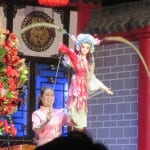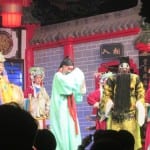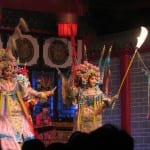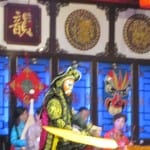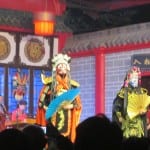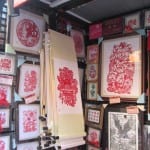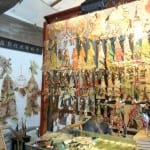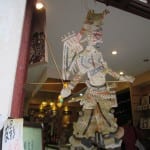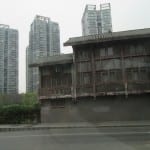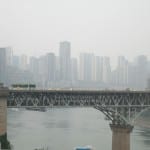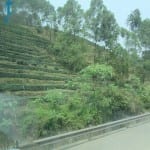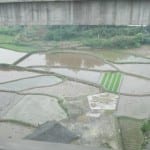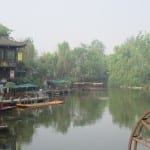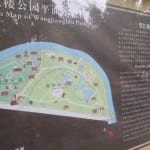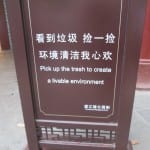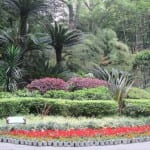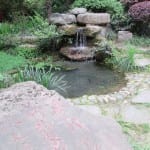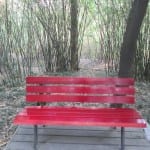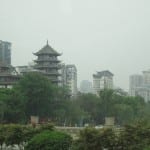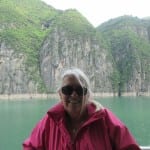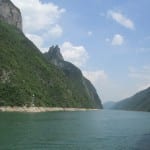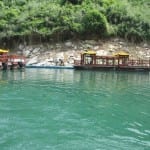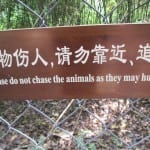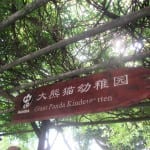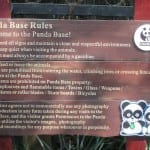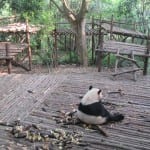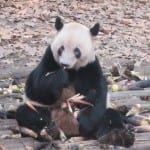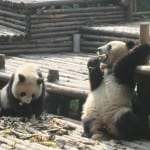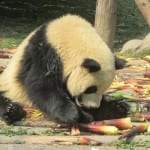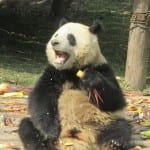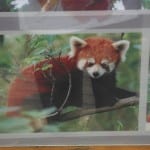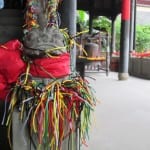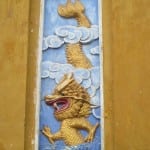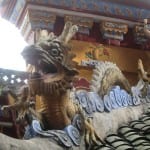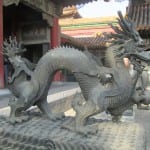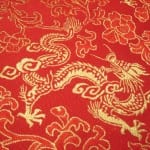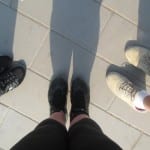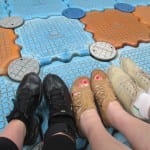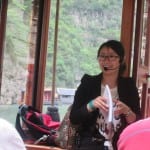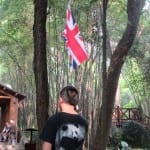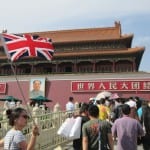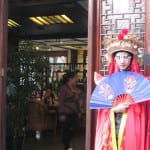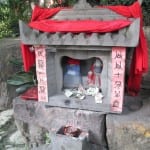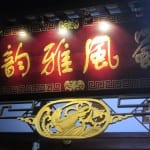Four weeks on and my Chinese adventures are fading. The folder of digi-pix on my laptop and shared memories with friends are all that reminds me of my amazing journey. I saw and heard the China of my imagination and childhood dreams; the traditional music, stick puppetry, Sichuan opera and a changing faces display with real fire where masks and clothes were switched in a blink of an eye – in less than a breath. Too quick to photograph.
I loved the calligraphy, the visual style of writing with images instead of letters, and the art of paper cutting, a simple idea made complex. It makes 19th century English silhouettes look primitive.
I saw China as it is today; a rapidly developing country with massive construction projects, overcrowding, air pollution, limited sanitation and bad water.
The colour green surprised me; it was green in the parks and gardens, paddy fields, bamboo forests and tea plantations. Traditionally the Chinese have always lived in harmony with nature. It was Mao who said nature was there to be dominated and controlled. Today the Chinese say Mao was 60% right. They are renewing their relationship with the natural world. New cities incorporate public parks and gardens. Chengdu, which has adopted relaxation as its mantra, promotes recycling and green attitudes.
The Yangtze river was 57 shades of green, reflecting the sides of the wooded gorges, which used to be the tops of mountains.A stark white water line was a permanent reminder of how the Three Gorges Dam represents one aspect of nature still very much under control.
I don’t think I’ve mentioned the pandas yet.
My closest previous encounter was Chi Chi who lived at London Zoo. By the time I saw her she was stuffed behind glass in the Natural History Museum. In China I saw my first living pandas at the Breeding Centre outside Chengdu.
Pandas get up, eat bamboo, then sleep. You have to be there early. Bamboo is hard as rock, and so tough it’s used as scaffolding poles. Their powerful teeth and jaws crunch it like sugar. You hear the panda before you see it.
Pan Da translates at Fat Big and generations of emperors killed pandas for their pelts. In 1949 the Panda was put under protection. A 2014 census found 1864 giant pandas in the wild. The WWF claims this is an increase of 17% from the late 1970s. The black and white panda is from the bear family; the red panda from the racoons. At the breeding centre we were surprised by a red panda which dropped from the trees onto the platform, staring at us intently before turning its back and walking away.
Another traditional symbol of Chinese culture is the dragon. They are everywhere. Old and new. Past and present. Dragons are the heart of myth and legend. Like great floods and creation stories, they exist across countries and cultures, each with their own version, The dragon is the only mythical animal in Chinese horoscopes. It’s the sign of rulers and leaders. Everyone wants to be a dragon.
We all left something of ourselves in China. My new panama hat was accidentally abandoned in Beijing. One friend mislaid her raincoat in Chongqing while another put her valuables in the hotel safe in Chengdu and left them there. At least they were secure and retrievable. Not like the fellow traveller who lost his passport and had no idea where it might be. He also lost several days of his trip applying for the essential paperwork for our internal flights – which was manageable – and to leave the country – which was not. At the end we left him behind, still waiting for the replacement visa and papers needed for a temporary passport, hoping to transfer his tickets to a different flight. Losing your passport is never advisable but losing it in China is probably the worst place of all.
My credit card was hacked. 48 hours after Xian, its details were being used in Saudi Arabia. The NatWest fraud squad sent texts asking if this was legitimate and blocked the card. Pin codes on transactions were uncommon. Most places asked for signatures. It showed the value of taking a backup card and keeping your phone switched on.
Two people got lost. Unable to read the signs or speak any Chinese, they couldn’t find their way back to the meeting point. We understood then why the guide was so insistent we had her phone number at all times. It emphasised the vulnerability created by our lack of linguistic skills.
I returned home with renewed respect for our Chinese students dealing with the complexity of English language and custom. I realised the difference some Chinese signage around the university would make, and recalling fellow travellers carrying forks in their backpacks, I wondered why there were no chopsticks in the Atrium. I felt I gained a better understanding of the potential for confusion with our self-service style food and how easy it was to misunderstand the difference between gravy and custard. While I was away the Quad Diner opened a King Asia Noodle bar; its menu including noodle broth, Szechuan beef, Char Siu pork, Gyoza and Wantons.It reminded me how strange it is when food is unfamiliar.
All I knew about China was through books and films but this type of knowledge is only ever based on simulation. Anderson (1983) and Baudrillard (1994) have much to say about the nature of reality. In times east and west collided. One restaurant served us a plate of pale limp chips, a concession to dietary expectations. It looked out of place but was pounced on with cries and sighs of relief. The reality of travel is to leave behind the familiar and step out into the strange but sometimes the strange is dealt with badly. We can’t always help it. I’ve been asked several times if I would go back and I think I would – but there are other countries to visit first!
Anderson, B. (1983) Imagined Communities. Reflections on the Origin and Spread of Nationalism, London and New York, Verso
Baudrillard, J. (1994) Simulacra and Simulation, translated by sheila Faria Glaser, Ann Arbor The University of Michigan Press
